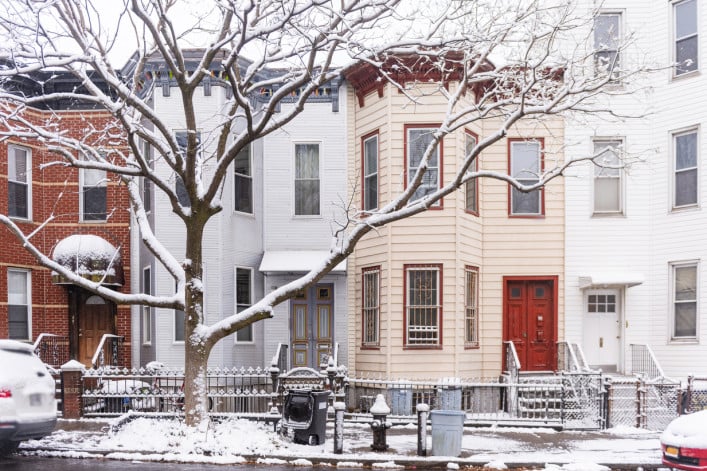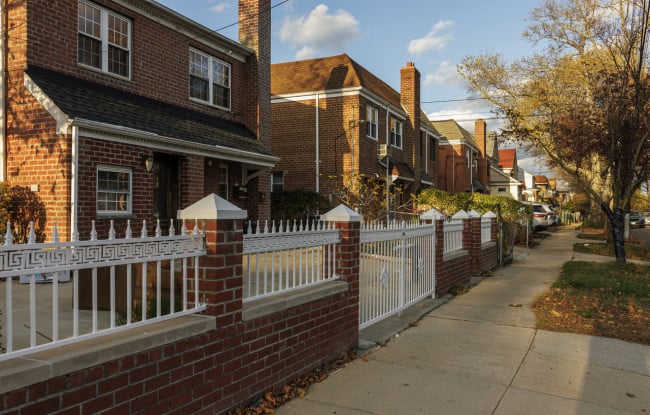Deed theft bills would warn owners, council members about potential scams in progress
- One bill would inform owners by text and email about new mortgage and deed documents
- Hudson’s bill would notify local council members of suspicious filings for long-time owners

Two bills would expand how the Department of Finance notifies relevant parties of deed and mortgage-related filings.
iStock
New York City property owners—and their City Council representatives—could soon get a heads up when a new deed or mortgage-related document is filed on a property, under two bills discussed by the City Council’s Committee on Finance last week.
Both bills are meant to target deed theft—when a scammer steals the deed of a property from its owner, often through forgery. Thieves target vulnerable New Yorkers, like older residents and those in gentrifying communities, said Council member Crystal Hudson, who authored one of the bills, Int 0889.
“This is a problem that has plagued predominantly Black and brown communities for a long time,” Hudson told Brick Underground. “Any measure to try to address deed theft, deed fraud, and to help long-time residents and their families stay in their homes, is a great thing for the city.”
Getting your council member involved
Hudson’s bill would require that the city’s Department of Finance (DOF) notify the local city council member when someone files a deed or mortgage-related document on a property that hasn’t traded hands in at least 30 years.
The bill is meant to give council members a chance to check in with long-time city residents who might be getting scammed, Hudson said. The bill was in part inspired by her own experience being “inundated with shady offers, calls, and pieces of mail” when she was caring for her mother, who had Alzheimer’s disease, Hudson said.
And council members have the time to intervene, given deed theft complaints aren’t extremely frequent, Hudson added. In NYC, there were 3,500 complaints of deed theft from 2014 through mid-2023—1,500 of which were in Brooklyn, according to the New York state Attorney General. (Council members can opt out of these notifications, under the bill.)
“I don't think it's too much to ask,” Hudson said. “This is literally the work that we are here to do. We're here to serve the public, serve the people, and serve New Yorkers—and even more specifically, to serve our constituents.”
Automatic email, text notifications for owners
Another bill, introduced last year by Council member Nantasha Williams, would require DOF to notify property owners when deed or mortgage-related documents are filed on their property by postal mail, email, and via text within 30 days.
Property owners can already get email or text notifications by registering with the DOF’s Automated City Register Information System (ACRIS)—a website that holds a trove of property-related documents since 1966. And property owners should receive annual city mailings, such as a notice about their property’s value.
But Williams’ bill would expand those notification requirements—mandating that owners automatically receive information via email, text, and postal mail (though New Yorkers can choose to opt out of electronic communications). Plus, those notifications would include information on how to address and report fraud, a spokesperson for Williams said.
Current deed theft protections for New Yorkers
The bills expand on New York’s existing protections against deed theft—which became a crime in the state last year.
New York law requires that courts pause an eviction in cases where there is an ongoing deed theft investigation. District attorneys can also “flag” properties that might have been bought fraudulently, and DOF can internally flag suspicious transactions, said DOF Director of Intergovernmental affairs Jacob Capistran, at the Tuesday council hearing.
But any extra deed theft protections can really benefit New Yorkers, said Scott Kohanowski, general counsel at the Center for NYC Neighborhoods, a nonprofit that promotes affordable homeownership in New York.
He said that Williams’ bill allows DOF to include more documents in its notification program so the department can react to evolving property scams.
“The bad guys are always changing their tactics,” Kohanowski said. “Anything to buttress existing measures that alert homeowners when there may be some scam or fraud is important and necessary.”
Suspect deed theft? Here’s what you can do
Hudson was optimistic her bill will be passed into law, and a representative for Williams said the council member is working to secure enough votes to get it passed. In the meantime, you can sign up for email and text notifications about your property online here.
If you’re concerned you might be facing a deed theft scam, don’t hesitate to get help. You can contact the Center for NYC Neighborhoods by calling their hotline at 855-466-3456 from 9 a.m. to 5 p.m. on weekdays. Or, check out HomeownerHelpNY, a free online source of information on scams funded by the state’s Homeowner Protection Program.
You can report fraud to the NYC Sheriff’s Office online or by calling 718-707-2100. You can also file a complaint online with the State Attorney General’s Office or contact the Attorney General via email or at 1-800-771-7755.



























